Germans Win Group A at FINA Men’s Water Polo World Cup 2018; Hope to Qualify for 2019 FINA Worlds Tonight
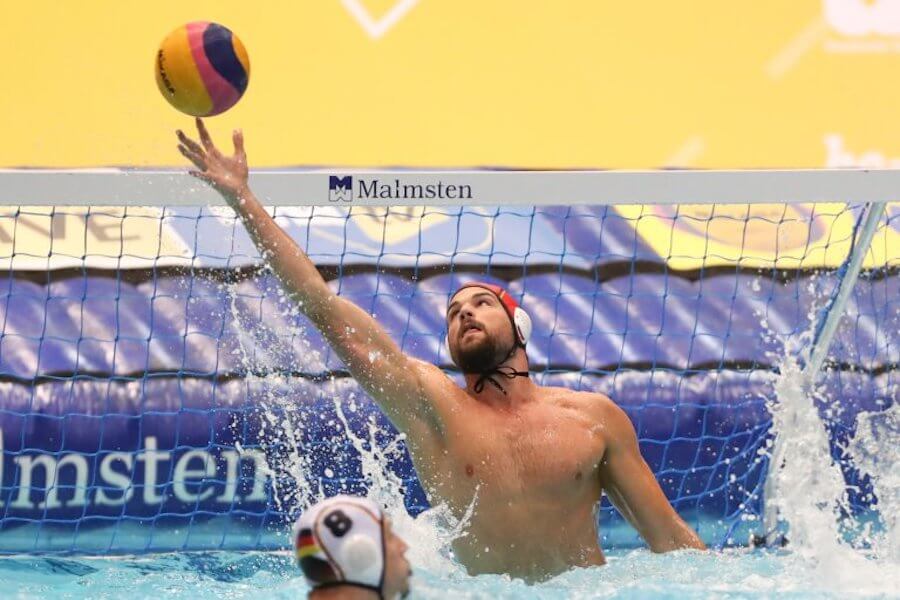
By Michael Randazzo, Swimming World Contributor
BERLIN, Germany. There was a party at the Europa Sports Park Thursday night—even though the home team lost. Despite a narrow 10-9 defeat to Australia, by virtue of results against common Group A opponent Hungary, the host Germans attained the velvet box, so to speak: a date with South Africa in tonight’s cross-over quarterfinals matches in FINA Men’s Water Polo World Cup 2018 play.
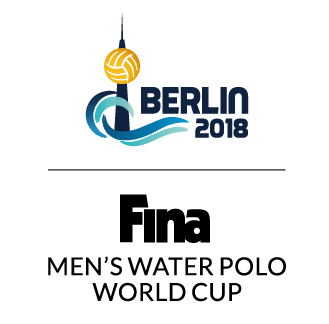
Julian Real, Dennis Eidner and Marko Stamm all chipped in two goals apiece for Germany (2-1); the group’s top team. It was Eidner’s goal with 3 minutes left proved decisive as Australia (2-1)—led by five goals by Joe Kayes—needed to be even in goal differential with the Germans to place higher in the group and obtain the easier match today. Despite the win, the Sharks (2-1) fell all the way to third in the group and today will face Croatia (2-0-1), one of the top teams in the world.
In three matches so far in Berlin—all losses—the South Africans have given up a total of 61 goals, while scoring only 11; the one bright spot being their match Thursday, a 15-6 loss to an Americans squad backstopped by goalie Jack Turner, who flew from his college team in San Diego for his first-ever start for the Team USA (1-2). Of all the teams Head Coach Dejan Udovicic might have drawn, the Hungarians—who with a number of young players have looked very beatable at this tournament—might be their best shot at advancing to the semifinals and securing a spot in 2019 FINA Worlds.
For the Germans, this tournament in their home pool represents an inspiring turn of events for a national team program that has been in the wilderness for more than a decade. They last qualified for an Olympic Games in 2008, when they placed 10th in Beijing. With a win tonight—a virtual certainty given that the South Africans have not come close to winning a FINA-sponsored match the past two years—the Germans will advance to the semifinals and qualify for their first FINA World Championship since 2013.
The top four finishers at this tournament automatically qualify for the 2019 FINA World Championships to be held in Gwangju, South Korea.
Head Coach Hagen Stamm—with multiple Olympic appearances as a player, including a third place finish in 1984, as well as leading the 2008 team as a coach—was understandably elated at the evening’s turn of events.
“Our team has good morale and is fighting [hard],” Stamm said in his native tongue after the Australian match. Then, acknowledging the clear path ahead if they beat South Africa: “We can book a flight to Korea.”
This opportunity for success has been a long time in the making; 12 years in fact. That is the last time Germany hosted a tournament of this magnitude.
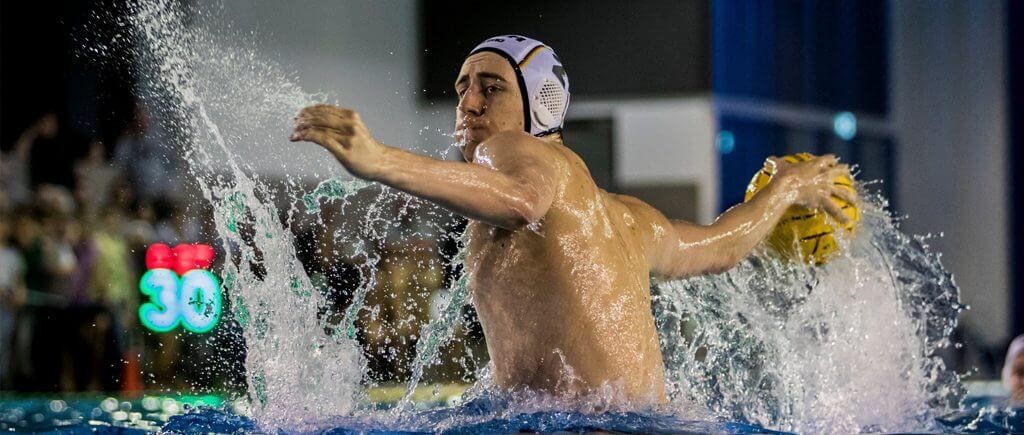
Ben Reibel. Photo Courtesy: FINA
“We showed in 2006 that we were able to organize such a tournament—we had World League Final.” Stamm said in English. “For us, it is important to have these games home, to have spectators… we have so many people responsible for this result and we are so happy to be in Berlin.
“I’m especially happy because this is my hometown,” he added—putting an extra spin on the feel-good moment.
It turns out that the Germans’ pivotal match of the tournament—so far—was the opening match against Hungary. Hagen expressed surprise at this outcome; he did not expect his team to beat the 2017 FINA World Championship runner-ups. But the 12-10 win to open play drastically altered the home team’s fortunes; the two goal differential against Hungary overcame the one-goal loss to Australian’s loss, giving Germany top seeding in their group and pairing them with the South Africans, the worst team in Group B.
There’s obviously more work to be done, but the Germans have experience in the field to guide them. Real, the German captain, was on the 2008 team in Beijing, and he has been a stellar performer so far in this tournament. Add in the mix of the new—Ben Reibel (5 goals) is the son of Guido Reibel, who like Stamm was a member of the German team that finished seventh at the Barcelona Games in 1992—with Eidner (7 goals) and Real (7 goals) and there’s more to this team than just a surprising tournament result.
The Australians were clearly disappointed; according to Head Coach Elvis Fatovic they “missed by one point” avoiding a far more difficult match. Croatia (2-0-1 Group B) are reigning FINA World Champions. But Fatovic—who for many years played and coached in Croatia—certainly had a lot to feel good about in one of the more competitive games of the tournament. Kayes, a massive fixture at center, was virtually unstoppable when the Sharks enjoyed the man advantage. He hit on all four of his shots on the power play. Only being rolled from the match with three minutes due to exclusions ended his dominance of the German defense.
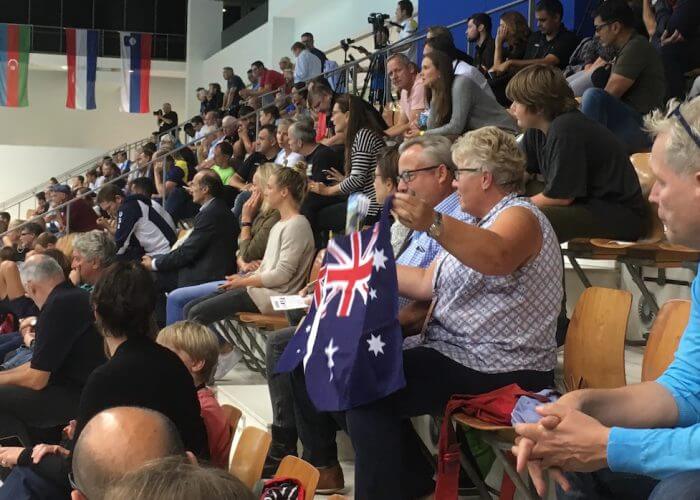
Australia is in the House! Photo Courtesy: M. Randazzo
In the mass of hundreds of enthusiastic Germans, the Aussies had their own cheering section. Lauren Bain, Deputy Head of Mission for the Australian Embassy in Berlin, was in the stands with her children, waving her country’s colors and delighted to cheer on her personal home team.
“Here in Berlin it’s not every day that you get to see your national team play, so I’m very proud to be able to come and support them tonight,” the Melbourne, native said in between periods. When asked about the atmosphere, where Germans were quite vocal about their team, Bain replied: “We’re in the minority tonight obviously but we’re really enjoying it.”
Overall, the Sharks were a healthy 6 of 13 with the man advantage, and only two Australians—Kayes and Tim Putt—were rolled from the game, an important consideration given the proposed reduced rosters being tested here in Berlin.
Perhaps now free to speak his mind thanks to his teams transformed status, Stamm had much to say about the proposed rule changes, including 11-player rosters for the 2020 Olympics.
“I like the idea to speed up the game,” he explained in English, “and I think some rules are really good. I like six-meters [new dimension for a free shot] because five-meter shooters are too dangerous for goal keepers. I like changing [substituting players on the fly], especially for centers in the middle.
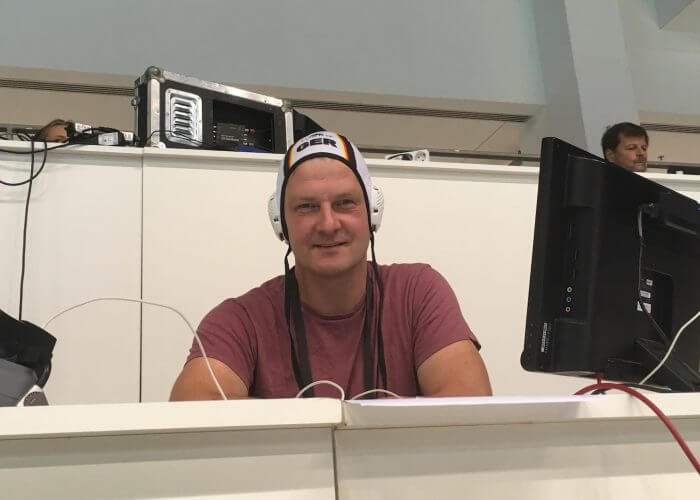
Are Germans water polo crazy?! Photo Courtesy: M. Randazzo
I like direct corner; you saw one excellent goal from [Germany] today, ball directly to the center. So we have some really good things. I think FINA’s on the right path.”
When asked about the biggest change—smaller rosters—Stamm was crystal clear in his solution.
“We need four personal fouls for all players, then we can stay on 11 for the Olympics,” he said. “It is stupid if you have no players to change [as substitutes]. It’s close; today we had 13 exclusions. It can happen that you have three or four players out and then what should I do?!”
For now, what the Germans must do is win over South Africa, which is sure to set off a raucous celebration at the Europa Sports Park. After that, it’s the semifinals and perhaps finals for them—and travel plans for South Korea.




.png)